| Solar eclipse of December 13, 1974 | |
|---|---|
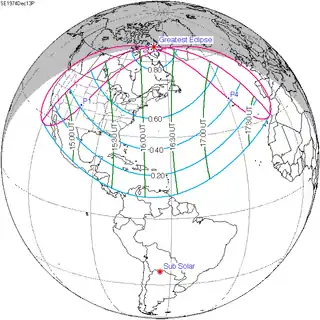 Map | |
| Type of eclipse | |
| Nature | Partial |
| Gamma | 1.0797 |
| Magnitude | 0.8266 |
| Maximum eclipse | |
| Coordinates | 66°48′N 69°24′W / 66.8°N 69.4°W |
| Times (UTC) | |
| Greatest eclipse | 16:13:13 |
| References | |
| Saros | 151 (12 of 72) |
| Catalog # (SE5000) | 9453 |
A partial solar eclipse occurred on December 13, 1974. A solar eclipse occurs when the Moon passes between Earth and the Sun, thereby totally or partly obscuring the image of the Sun for a viewer on Earth. A partial solar eclipse occurs in the polar regions of the Earth when the center of the Moon's shadow misses the Earth.
Related eclipses
Eclipses in 1974
- A partial lunar eclipse on Tuesday, 4 June 1974.
- A total solar eclipse on Thursday, 20 June 1974.
- A total lunar eclipse on Friday, 29 November 1974.
- A partial solar eclipse on Friday, 13 December 1974.
Solar eclipses of 1971–1974
This eclipse is a member of a semester series. An eclipse in a semester series of solar eclipses repeats approximately every 177 days and 4 hours (a semester) at alternating nodes of the Moon's orbit.[1]
Note: Partial solar eclipses on February 25, 1971 and August 20, 1971 occur in the next lunar year set.
| Solar eclipse series sets from 1971–1974 | ||||||
|---|---|---|---|---|---|---|
| Descending node | Ascending node | |||||
| Saros | Map | Gamma | Saros | Map | Gamma | |
| 116 | 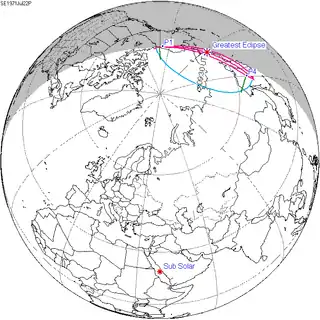 1971 July 22 Partial | 1.51298 | 121 | 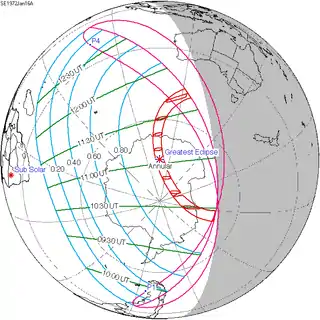 1972 January 16 Annular | −0.93651 | |
| 126 | 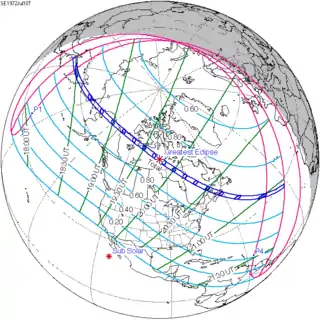 1972 July 10 Total | 0.68719 | 131 |  1973 January 4 Annular | −0.26441 | |
| 136 | 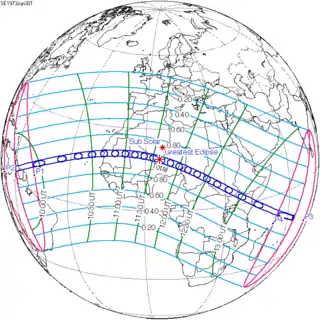 1973 June 30 Total | −0.07853 | 141 | 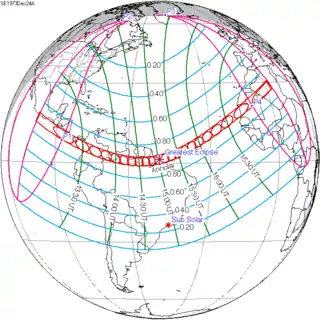 1973 December 24 Annular | 0.41710 | |
| 146 |  1974 June 20 Total | −0.82388 | 151 |  1974 December 13 Partial | 1.07974 | |
Metonic series
The metonic series repeats eclipses every 19 years (6939.69 days), lasting about 5 cycles. Eclipses occur in nearly the same calendar date. In addition, the octon subseries repeats 1/5 of that or every 3.8 years (1387.94 days).
| 22 eclipse events between December 13, 1898 and July 20, 1982 | ||||
|---|---|---|---|---|
| December 13–14 | October 1–2 | July 20–21 | May 9 | February 24–25 |
| 111 | 113 | 115 | 117 | 119 |
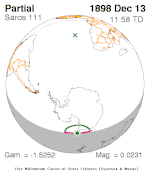 December 13, 1898 |
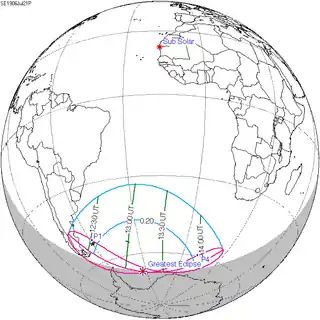 July 21, 1906 |
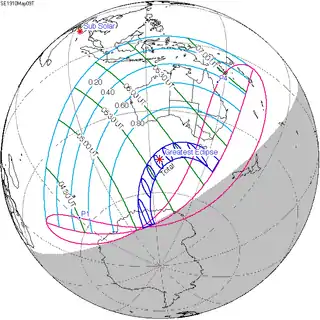 May 9, 1910 |
 February 25, 1914 | |
| 121 | 123 | 125 | 127 | 129 |
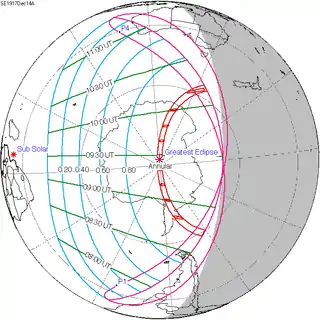 December 14, 1917 |
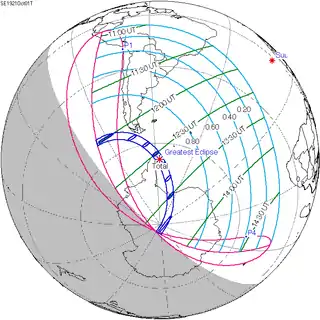 October 1, 1921 |
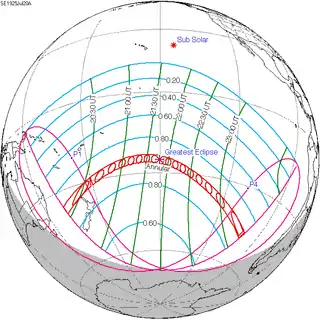 July 20, 1925 |
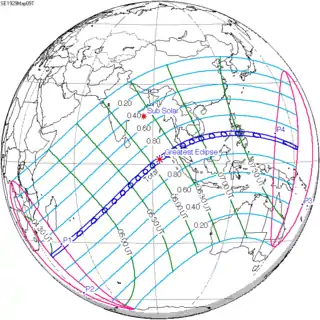 May 9, 1929 |
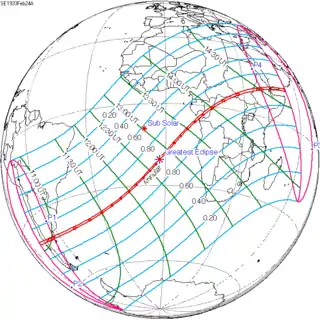 February 24, 1933 |
| 131 | 133 | 135 | 137 | 139 |
 December 13, 1936 |
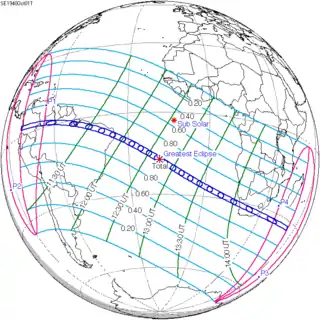 October 1, 1940 |
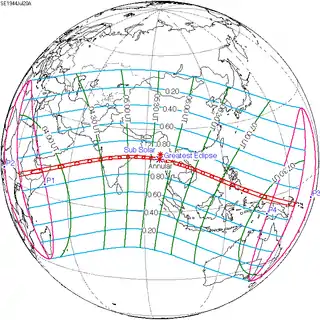 July 20, 1944 |
 May 9, 1948 |
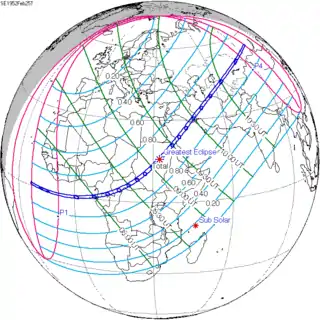 February 25, 1952 |
| 141 | 143 | 145 | 147 | 149 |
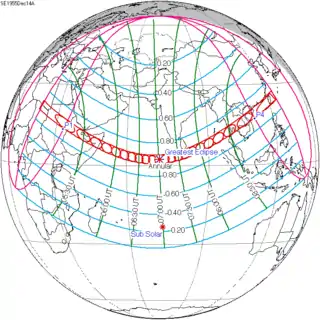 December 14, 1955 |
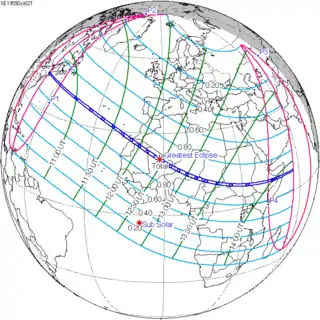 October 2, 1959 |
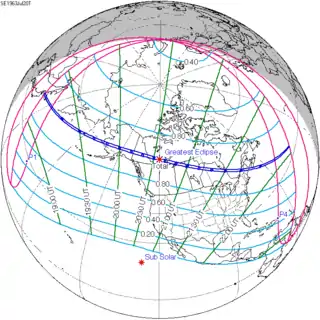 July 20, 1963 |
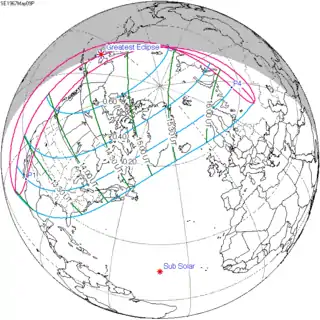 May 9, 1967 |
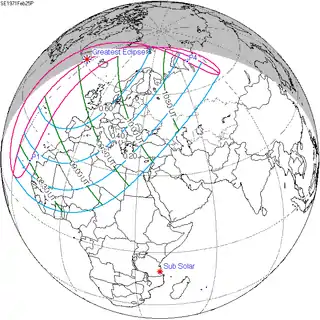 February 25, 1971 |
| 151 | 153 | 155 | ||
 December 13, 1974 |
 October 2, 1978 |
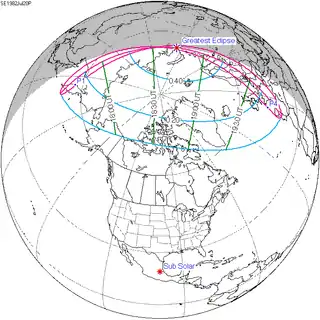 July 20, 1982 | ||
References
- ↑ van Gent, R.H. "Solar- and Lunar-Eclipse Predictions from Antiquity to the Present". A Catalogue of Eclipse Cycles. Utrecht University. Retrieved 6 October 2018.
External links
- Earth visibility chart and eclipse statistics Eclipse Predictions by Fred Espenak, NASA/GSFC
.jpg.webp)

